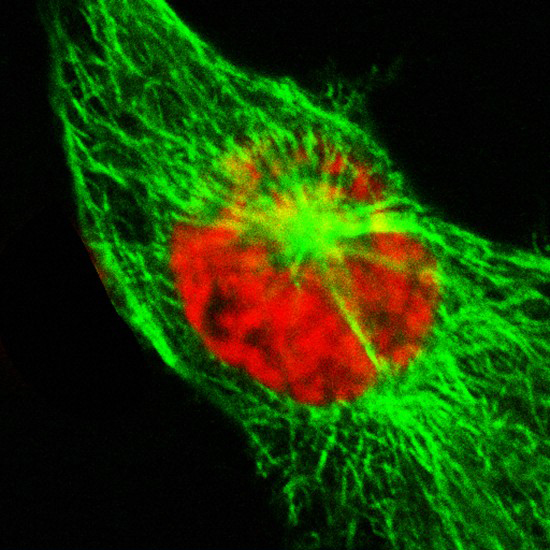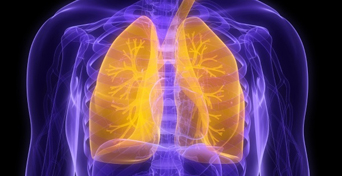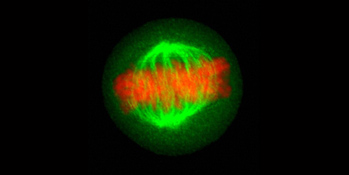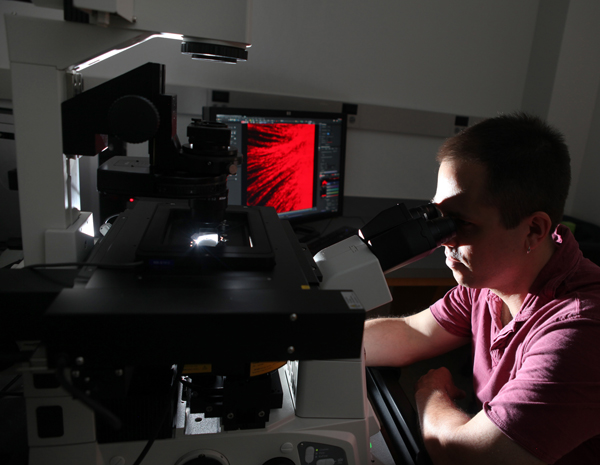Health And Medicine
-

Glasses bring girl’s world back in focus
Once upon a time, teenage girls were not clamoring to sport a pair of thick, black, oversized eyeglasses. Read MoreAug 8, 2013
-

Nuclear shield against cell death
The protein SARM appears to protect cells from inflammation-driven death by stabilizing the nuclear laminin scaffold. Read MoreAug 8, 2013
-

Vanderbilt scientists discover potential new way to treat anxiety
Chemically modified inhibitors of the COX-2 enzyme relieve anxiety behaviors in mice by activating natural “endocannabinoids” without gastrointestinal side effects, Vanderbilt University scientists will report next week. Read MoreAug 5, 2013
-

Cognitive complaints, Alzheimer’s risk studied
A study of cognitive complaints in older adults showed that memory concerns from both the patient and an informant was most predictive of converting to Alzheimer’s disease or dementia within three years. Read MoreAug 1, 2013
-

Study explores race differences of lung cancer risk
Vanderbilt research scientist Melinda Aldrich, Ph.D., MPH, has been awarded a National Institutes of Health Academic Career Award to investigate some of the genetic secrets behind a greater risk of lung cancer among African-Americans compared with other racial and ethnic groups. Read MoreAug 1, 2013
-

Case study explores stroke, meningitis link
A case series by researchers at Vanderbilt University Medical Center examines three patients transferred here with ischemic stroke who later received a diagnosis of fungal meningitis attributed to tainted injections for low back pain, part of a multi-state outbreak. Read MoreAug 1, 2013
-

Factor’s role in long bone development
Insight into how the protein neurofibromin participates in the signaling pathway that produces the body’s long bones has implications for fracture healing in some patients. Read MoreJul 31, 2013
-

Motor protein revs up cell division
A motor protein that helps drive cell division may be a promising new target for cancer therapeutics. Read MoreJul 29, 2013
-

Reducing fatal rhythms after heart attack
Reducing heart muscle response to calcium could decrease the risk of fatal arrhythmias after heart attacks. Read MoreJul 26, 2013
-

App helps children manage their health care routines
Adults have calendar applications on all their digital devices to remind them of appointments and what’s next on their agenda. Read MoreJul 25, 2013
-

Award bolsters study of bladder cancer chemo resistance
David DeGraff, Ph.D., has received the 2013 BCAN Young Investigator Award for Bladder Cancer Research. Read MoreJul 25, 2013
-

‘Bionic eye’ new option for retinitis pigmentosa patients
Vanderbilt University Medical Center has been chosen as one of 12 sites in the United States to offer the first FDA-approved bionic eye for the treatment of retinitis pigmentosa (RP). Read MoreJul 25, 2013
-

Pollen counts boost risk of rare drug reaction: study
High pollen counts could trigger angioedema, a rare adverse reaction of Angiotension converting enzyme (ACE) inhibitors, Vanderbilt University researchers have found. Read MoreJul 25, 2013
-

Visualizing data on network ‘maps’
The new web application NetGestalt will allow investigators to simultaneously visualize different types of data for the same gene – such as mutation, expression and modification. Read MoreJul 25, 2013
-

Probing roles of a cell death protein
Vanderbilt researchers have discovered new roles for a protein involved in cell death processes that are activated to prevent tumor-causing DNA mutations. Read MoreJul 17, 2013
-

Defining patient retention
Vanderbilt researchers propose guidelines for defining patient retention in clinical studies – an important parameter that affects study conclusions and program evaluations. Read MoreJul 15, 2013
-

Methods for imaging myelin loss
Certain MRI metrics can be used to assess myelin loss in multiple sclerosis, which is important for planning and monitoring therapy. Read MoreJul 12, 2013
-

New ‘super’ microscopes sharpen cellular imaging
Two new “super-resolution” optical microscopes have put Vanderbilt University Medical Center on the cutting edge of cellular imaging, and are giving researchers their first views of the cell at the molecular level. Read MoreJul 11, 2013
-

New tool helps research publications stay NIH-compliant
The National Institutes of Health requires scientists to provide public access to any peer-reviewed publications resulting from NIH-supported research through PubMed, the National Library of Medicine’s premier search system. Read MoreJul 11, 2013
-

Project seeks to create ‘bioartificial’ kidney
Nephrologist William Fissell IV, M.D., associate professor of Medicine and Biomedical Engineering, is intent on creating and mass-producing an implantable bioartificial kidney that can transform quality of life and prospects for survival for people with chronic kidney disease who would otherwise be forced onto dialysis. Read MoreJul 11, 2013